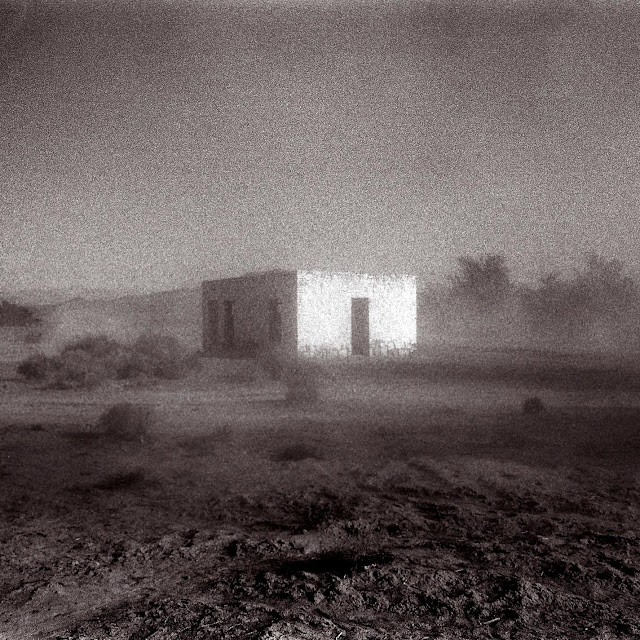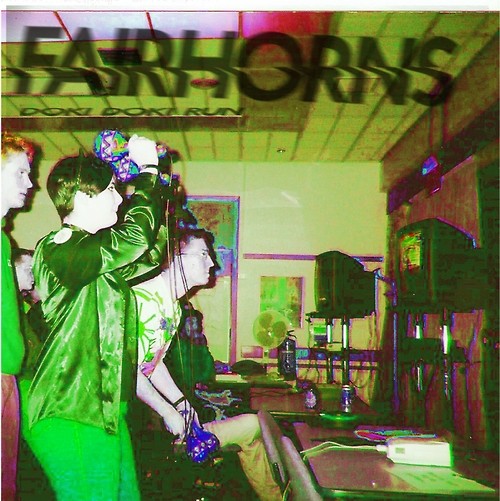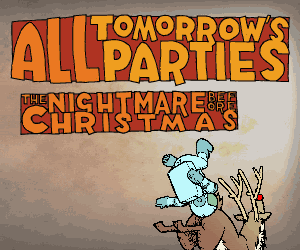Were Baltimore's dreamiest of its innumerable dream popsters Beach House a colour, theirs would indubitably be a wash of alluring blue. To paraphrase Bloom: track 6, or Troublemaker, they surged out of the blue and into the redder hearts of many; no, most with previous LP Teen Dream and musically, in Bloom, they've maintained that oneiric sound that remains clearer than an azure sky. Clear, lucid, and above all irrefutably crystalline. Simplicity at play, almost. Maybe a baby blue. Live though, they can truly rasp if and when they see fit, as they transpose their estimably inimitable sound into a more electric hue. As a live prospect therefore, the pair are as electrifying as the sparks that not so much fly, as flicker and simmer between their two hunched silhouettes.
If there's a more consummate pairing currently operating within the expansive parameters of pop, I'm yet to encounter them either on record or indeed within this, the live arena. This is London's finest of such arenas, and it's testament to the great strides the duo have made of late – the thunderous gallivant of a "black and white horse", it could conceivably be likened to – that they be rewarded with a headlining turn in this great British listed building.
Sparkling some early life into the show, they begin – as well they may – with Bloom: track 2, and album frontrunner Wild, a cowering Alex Scally radiating wistful stares over his shoulder at the almost aquatic Victoria Legrand. She plays the central siren perched atop a leviathan hunk of keyboard. She is the centrifugal force, her blustery if oft restrained vocals propelling each and everything, and yet she is simultaneously the anchor; the heart of it all. A once subaqueous creature now beached so that we may feast on her marvels. Scally's Fender weaves about her inviting swathes; hangs off her every word. Off the pained moans of an almost rigorous and absolutely invigorating Lazuli. In amongst this and that, the pair practically shed some of the more gorgeous harmonies recently recorded: the ever urbane Walk In The Park; the clattering, thalassic groove to Other People; an affecting-as-frostbite Norway. Fairy twinkles glister like Northern Lights, whilst Legrand's deep and murky wails sound as though icy sighs hung from a spindly stave. Inadvertently, Beach House have constructed the perfect pop show, and its every composition resonates with the unifying affection of a greatest hit.
But it's a lyric from a resplendently hi-fi take on the semi-precious Lazuli to which I cling for a moment. Its name derived from the lapis stone – Afghani chunks of a coincidentally intense blue – if it may tie in neatly with the impressionistic allegories of earlier then it's its recurring refrain of "Like no other, You can't be replaced" that is to be cherished once excavated. For Beach House have also become the sort of band that deal almost exclusively in twos. There's a stark contrast between their Carpark Records releases (the eponymous début and the subtly glorious sophomore, Devotion) and their Sub Pop stuffs (Teen Dream and of course Bloom) just as Scally and Legrand bring respectively stark idiosyncrasies to the candlelit table from which they dine on the sleeve of Devotion. But the audience they now attract is, appositely, as couplesy as denim. There's plenty of that particular material strewn about the place, although newfound loves and rekindled rapprochements are almost excessively ubiquitous. Forearms stray, as the odd head sways to the slo-fi dirge that is Heart Of Chambers. It's as torpid as any midwinter, and this is an effect that's not so much anticipated as it is fervently awaited. The love-ins aren't so much so.
Though Wishes is as chilly as a whisper brushed down the back of the neck – a bluesy lull machined by that umpteen-track box of wonderment in Scally's briefcase. Used To Be elucidates just how far off such supernal charms their every contemporary is at the minute, as they imperiously remould its elegiac pop guile. Nobody does it better, and little is better than an impromptu eldritch Scally wig out to prelude an otherwise ethereal Master Of None.
To the doting quasi-obsessive, this one glistens with a nonpareil originality. However it's marred by couples making squalid advances, and puff-chested males making considerably more vexatious commentaries. "The Weeknd sampled this. You know, Abel Tesfaye. He's done stuff with Drake." Superficially insightful, if utterly irrelevant it's indicative of that irksome latter-day propensity to go frequenting shows one feels one ought, and to subsequently spew inanities throughout. Though it is but fleeting tedium soon to be momentarily cleansed from thought, as the burgeoning chorus to Silver Soul bursts wide open. Now polychromatic lighting bathes the great, heaving below and yet such apathy begins to become not only all-pervasive, but we're all but saturated in the stuff. Deplorably, the floor's lifeless as an ocean-encrusted reef.
Saddening as the sumptuous gambol that is Zebra – during which their two voices assume the rich and textured tones of a celestial choir as once more the pair combine to a far greater effect than their scanty number – whilst Legrand may gush of it being a show they've "looked forward to for a long time", thereby echoing the sentiments soothed lately of David Longstreth it's one others seem intent on never remembering, thereby leaving themselves nothing to forget. That Weeknd reference therefore returns to plague all contemplation, for it's symptomatic of the way in which we now look to digest (or rather re-digest, perhaps) our dietary requirements musical. There's blooming, and with that bloomin' inspirational invention out there although we're hung up on remixes, reworks and ham-fisted reconstructions of original imagination that only serve to cheapen the art, and the artist's independence. And Beach House's grand successes and grandiose statements of late may in some way be deemed byproducts of these shifts. Though what's more conclusive is that in a more intimate setting, the band invite those more attentive souls into a homely singalong shack, within which a uniting sense of intensity may be preserved. I'd previously thought the Roundhouse to be the ideal, and with that of course idyllic annular expanse for these woebegone shanties although on reflection, maybe it's just too sizeable. There's something distant and unknowable to The Hours; transmogrified into lethargic trudge that only disconnects.
Legrand, too, is as monosyllabic as ever. Her performance enchants; her inter-song aloofness meanwhile disillusions to a degree. A protracted stutter of a false start to On The Sea more or less elongates the distance felt between us, even in this still relatively snug setting. Though that it slowly evolves into an hitherto unprecedented highlight indicates just how swiftly fortunes may change. An overwhelming flush of softness, the most ardent whoop of the soir is saved for the recalcitrant beat eventually coming good. To revert to attentions of popular culture, it's the sort usually heard emanating outta either the TV, or Weston-super-Mare come T4 On The Beach as its creaky rock rolls to a tremolo ebb and a most tremendous crescendo, plashes of blue sousing their stage.
The lovey-dovey mawk then peaks – inevitably, almost – with Take Care. It's only becoming more dreamy and divine as time passes, whilst 10 Mile Stereo is only intensifying as it's here amplified to an extraordinarily rhythmic cacophony in its closing moments. But, as much as any audience oughtn't cloud one's judgement nor afflict the enjoyment derived from any live show, it's an effect that is sometimes, alas, all but inescapable. Tonight is one of those instances, and it's an inertia that's as bewildering as that which bedevilled Bat For Lashes' recent norf London showing. And it's Troublemaker – the song, as opposed to those obnoxious prattlers aforesaid – that, although absent from tonight's setlist, comes to bear a weighty relevance. For as Legrand murmurs on Bloom: track 6: "Watch them unravel you/ Pulling everything apart" she most succinctly précises our general reaction and this faintly disconnected interaction. These are the I-was-theres; the I-don't-cares, and they imbue the eve with further blues.
Beach House aren't falling apart at the seams or owt – anything but. Though tonight has, if anything, been overtly expressive of exactly how strange a place a so-called paradise can really be.
























